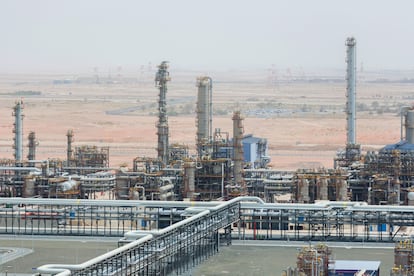Fossil fuel-producing countries ignore climate warnings and plan to increase coal, oil and gas extraction
While October broke another temperature record, a new study warns that governments are planning to produce around 110% more fossil fuels than what would be consistent with limiting warming to 1.5ºC


Despite climate warnings and the increasingly rapid expansion of renewable energies, fossil fuel-producing countries are still planning to increase the production of coal, oil and natural gas in the coming decades. To such an extent that, if these projections come true, it will be impossible to comply with the Paris Agreement, which establishes that, to avoid the most harmful effects of the climate crisis, the rise in global temperatures must be kept between 1.5ºC and 2ºC. Currently, global warming is 1.2ºC above pre-industrial levels.
A study presented on Wednesday — involving more than 80 researchers from several international institutes and the U.N. environmental agency — warns that governments are planning to produce in 2030 more than twice the amount of fossil fuels than what would be consistent with complying with the Paris Agreement. According to the Production Gap study, they are planning on producing around 110% more fossil fuels in 2030 than would be consistent with limiting warming to 1.5°C, and 69% more than would be consistent with limiting warming to 2°C.
Meanwhile, the planet is registering record-breaking temperatures. October, for example, was the warmest October recorded in the last 173 years (reliable measurements start in 1850). And scientists are clear that this is principally due to climate change generated by humans with the burning of fossil fuels. Despite this, governments plan to increase global coal production until 2030 and oil and gas production until 2050.
This is not only incompatible with the Paris Agreement, warns the report, but also clashes with forecasts by some major institutions, such as the International Energy Agency, which estimates that global demand for coal, oil and gas will peak this decade, even without a tightening of climate policies. In this context, there is a growing risk for investors that many fossil fuel projects will be abandoned, the study adds.
The Production Gap report is prepared by the Stockholm Environment Institute (SEI), Climate Analytics, E3G, the International Institute for Sustainable Development (IISD) and the United Nations Environment Programme (UNEP). The report analyzes the plans of the energy ministries of 20 of the main fossil fuel producing countries. These are, in alphabetical order, Australia, Brazil, Canada, China, Colombia, Germany, India, Indonesia, Kazakhstan, Kuwait, Mexico, Nigeria, Norway, Qatar, the Russian Federation, Saudi Arabia, South Africa, the United Arab Emirates, the United Kingdom and the United States.
Together these countries account for around 80% of the world’s fossil fuel production, explains Ploy Achakulwisut, lead author of the study and researcher at the Stockholm Environment Institute.
Contradictions
Fossil fuels are responsible for climate change because when they are burned to generate the energy, they emit greenhouse gases that overheat the planet. International agreements on climate change, such as the Paris Agreement in 2015, focus on extracting commitments from countries to cut emissions. But, for the moment, the root of the problem is not being attacked: they are not forcing countries to commit to cutting down fossil fuel production.
This leads to striking contradictions. Most of the 20 countries analyzed in the study — 17 out of 20 — have committed to reaching net-zero emissions by mid-century. However, “none have committed to reduce coal, oil, and gas production in line with limiting warming to 1.5°C,” the report highlights. The researchers also warn that most of the nations continue to “provide direct financial support to fossil fuel producers.” “There is a strong need for governments to adopt near- and long-term reduction targets in fossil fuel production and use to complement other climate mitigation targets and to reduce the risks of stranded assets,” the study concludes.
In recent years, there have been growing calls to set fossil fuel reduction targets in climate agreements. There has also been growing pressure from some countries to include in these agreements explicit references to the need to reduce or eliminate the use of all fossil fuels. This will be one of the battles of the next climate summit, COP28, which starts at the end of the month in Dubai.
But many activists have misgivings about the summit. The United Arab Emirates is one of the 20 fossil fuel producing countries analyzed in Wednesday’s report. Adnoc is the state-owned company that exploits the United Arab Emirates’ oilfields and, although the country has commitments to net-zero emissions by the middle of this century and policies to expand renewables, the company’s plans for this decade include continuing to increase oil and natural gas production.

This is the fourth edition of The Production Gap report, with the first released in 2019. According to Achakulwisut, the global gap between fossil fuel production forecasts and what is needed to comply with the Paris Agreement “has remained largely unchanged” in these four years, despite “encouraging signs of an emerging clean energy transition.” “The persistence of the global production gap puts a well-managed and equitable energy transition at risk,” warns the study.
Among the report’s conclusions, researchers argue that countries should “aim for a near-total phase out of coal production and use by 2040 and a combined reduction in oil and gas production and use by three-quarters by 2050 from 2020 levels, at a minimum.”
Sign up for our weekly newsletter to get more English-language news coverage from EL PAÍS USA Edition
Tu suscripción se está usando en otro dispositivo
¿Quieres añadir otro usuario a tu suscripción?
Si continúas leyendo en este dispositivo, no se podrá leer en el otro.
FlechaTu suscripción se está usando en otro dispositivo y solo puedes acceder a EL PAÍS desde un dispositivo a la vez.
Si quieres compartir tu cuenta, cambia tu suscripción a la modalidad Premium, así podrás añadir otro usuario. Cada uno accederá con su propia cuenta de email, lo que os permitirá personalizar vuestra experiencia en EL PAÍS.
¿Tienes una suscripción de empresa? Accede aquí para contratar más cuentas.
En el caso de no saber quién está usando tu cuenta, te recomendamos cambiar tu contraseña aquí.
Si decides continuar compartiendo tu cuenta, este mensaje se mostrará en tu dispositivo y en el de la otra persona que está usando tu cuenta de forma indefinida, afectando a tu experiencia de lectura. Puedes consultar aquí los términos y condiciones de la suscripción digital.








































